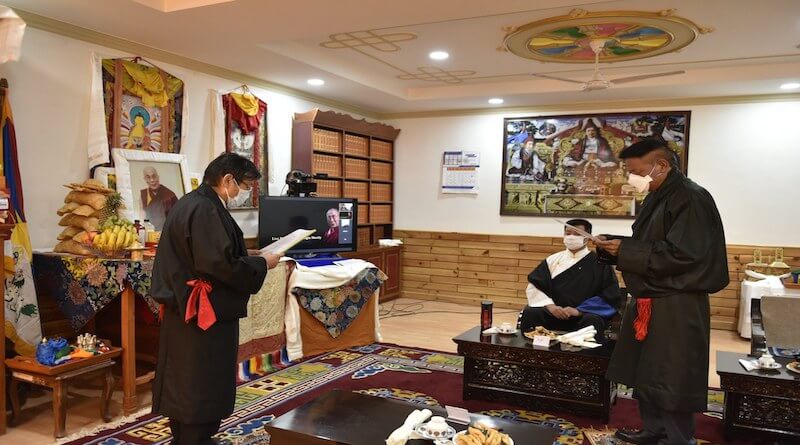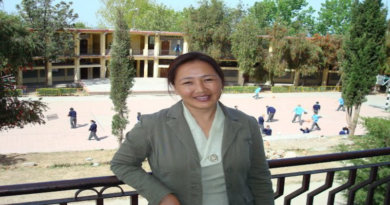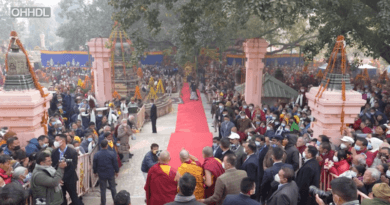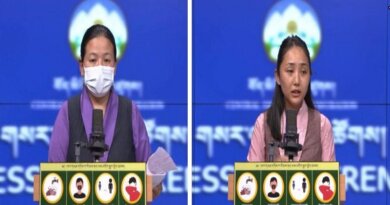Penpa Tsering sworn-in as third Sikyong, parliament skips ceremony
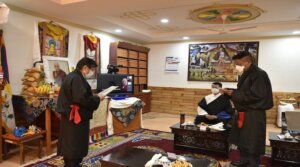
DHARAMSALA, 27 May: His Holiness the Dalai Lama today graced the occasion virtually as Sikyong-elect Penpa Tsering was swore-in as the new political head of the Central Tibetan Administration (CTA) in exile.
The Dalai Lama greeted the new Sikyong and thanked the outgoing Sikyong as he made a brief virtual appearance to grace the occasion.
The octogenarian Tibetan leader took pride in Tibet’s rich history and stated that “from King Songtsen Gampo to King Tri Ralpachen and the Dalai Lamas, we have our own administration, one with a long history.”
The Dalai Lama who devolved all his political authority to a democratically elected leader in 2011 stated that nearly one lakh exiled Tibetans now enjoys a democratic system, comparable to the other democratic governments across the world.
The ceremony was held today at the Songtsen Hall of the Tibetan Supreme Justice Commission here in Gangchen Kyishong. The Tibetan Supreme Justice Commission Secretary Tashi Gyatso stated that the Deputy Speaker of the Tibetan parliament-in-exile won’t be attending the ceremony.
“Though we sent an invitation to the Deputy Speaker, he said he won’t be attending it as decided at a meeting by the standing committee members of the parliament,” the TSJC Secretary announced on the Live webcast of the swearing-in ceremony.
As the former Speaker Penpa Tsering took the oath of office to officially begin his tenure as Sikyong, the political head of the Tibetan people from Dagpo Sonam Norbu, the Chief Justice Commissioner of the CTA who was impeached by the parliament along with the two Justice Commissioners, eight out of the eleven members of the 16th Tibetan parliament’s Standing Committee members have tendered their resignation in protest.
MP Serta Tsultrim, a standing committee member who was among those who have resigned today from the committee has cautioned the legitimacy of the oath-taking ceremony. He has stated in his resignation that with the Sikyong-elect today taking the oath of office from the Chief Justice Commissioner who still continues to hold the office at the TSJC illegally, it amounts to the unlawful oath-taking ceremony.
The Tibetan MP has added that the ceremony took place with total disregard to the resolution passed by over 2/3 of the parliament members and the charter of the Tibetan people and adding with it with the committee having its chairs, the Speaker and the Deputy Speaker, whom the committee reports to both having resigned, he declared that it is now simply not possible from today onwards to continue to discharge his duties as a standing committee member and as such he has no choice but to resign.
The TPiE impeached Dagpo Sonam Norbu, the Chief Justice Commissioner, and the two Justice Commissioners, Tenzin Lungtok and Karma Dadul on 25th March during the tenth day of the 10th session of the 16th TPIE by passing an official motion in the Parliament for the trio’s impeachment in accordance with the Clause (IV), Article (63) of the Charter of Tibetans in exile.
However, on 26 March, the Justices of TSJC held a press conference and declared that they accepted the Tibetan parliament’s impeachment but refute the charges.
The Justices stated then that, though the Tibetan parliament is at fault for not following proper procedures to introduce and vote on the resolution for their removal, they are vacating their offices solely out of respect for the constitution. (link)
The 60-year-old exile Tibetan Democracy is facing a constitutional crisis with the conflict between its parliament and the judiciary.
On 2 September 1960, the first Commission of Tibetan People’s Deputies from religious and provincial constituencies took their oath before His Holiness the Dalai Lama, thereby, formally inaugurating the Tibetan democratic system of governance.
The Dalai Lama devolved all his political authority to a democratically elected leader despite the impassioned appeals by the Parliament and the Tibetan people to stay on as the nominal head of state in 2011, thereby completing the transition to a secular democracy.

